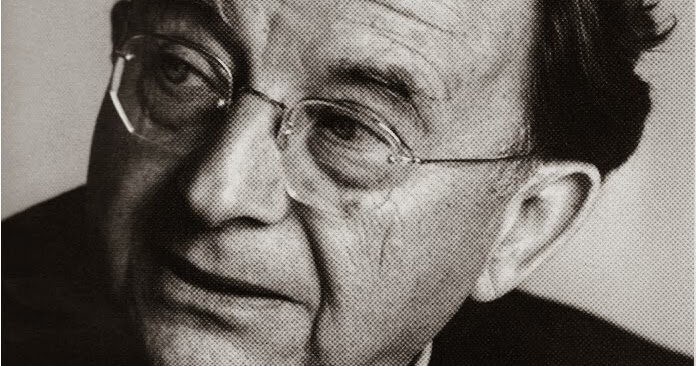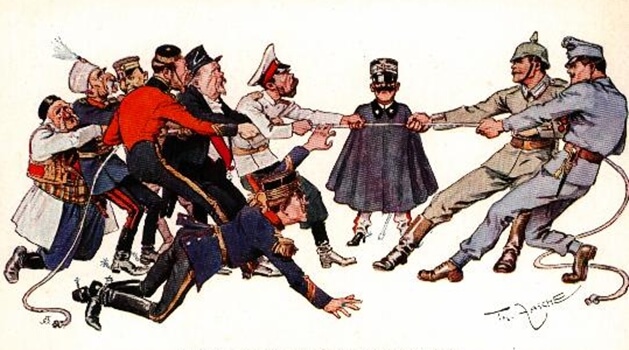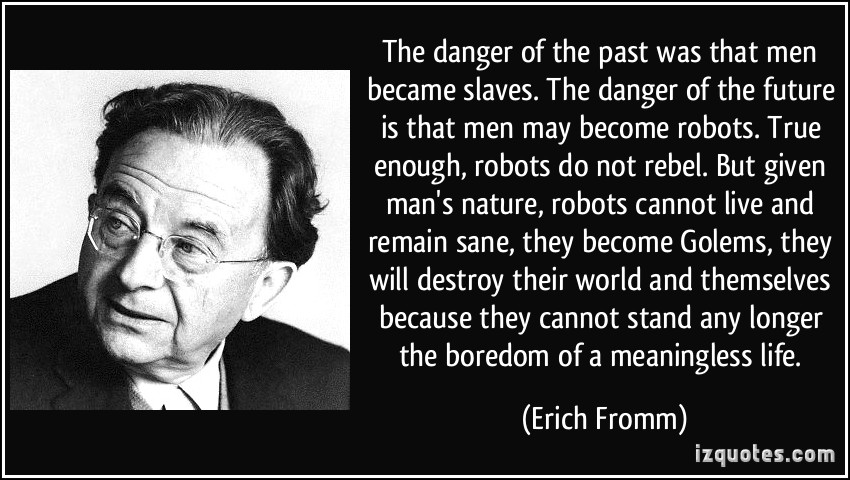Erich Fromm and Humanistic Psychoanalysis


Written and verified by the psychologist Valeria Sabater
For Erich Fromm, everybody’s main goal in life is to become stronger, freer, more noble – essentially, the person you were meant to be. This is representative of his humanistic perspective, which was revolutionary for such an important figure in psychology at the time.
When psychoanalytic theory is referenced, some people make the mistake of viewing it as a rigid and specific entity made up of clearly-defined concepts, dynamics, and approaches proposed by the father of psychoanalysis, Sigmund Freud. Perhaps they forget that within this approach, there are other schools of thought that have enriched the foundations of psychoanalysis by deviating from Freud’s words and ideas.
“Only a person who has faith in himself can be faithful to others.”
-Erich Fromm-
Erich Fromm was one of these deviants. In the 1940s, the Jewish German social psychologist decided to break from the psychoanalytic doctrine of the Frankfurt Institute for Social Research and completely renovated the theory and practice of psychoanalysis, leading to a more cultural, humanistic approach. For example, he swapped Freud’s idea of libido as the life drive for a more practical one that included a new understanding of assimilation and socialization.
Fromm was above all a fascinating philosopher and one of the best representatives of 20th century humanism. In his three most significant books (Escape from Freedom, The Art of Loving, and The Heart of Man), he left us a universe of thoughts, reflections, and theories that put psychology hand-in-hand with anthropology and history, and continued the legacy of Sigmund Freud and Karen Horney.

Erich Fromm and the systemic crises of Western society
In order to understand Erich Fromm’s theory of humanistic psychoanalysis, it’s necessary to get to know him as a person, to understand his roots, the context in which he grew up, and the devolving world that made up his most immediate reality. This will shed light on the things that served as guidance and inspiration for his theories.
When you read his autobiography, Beyond the Chains of Illusion, and focus on his childhood and adolescence, it’s easy to see that they weren’t exactly happy times for him. His father was an aggressive businessman, his mother suffered from chronic depression, and he was raised under the markedly strict norms of Orthodox Judaism. During that time, he experienced two defining moments.
“Nationalism is our form of incest, is our idolatry, is our insanity. ‘Patriotism’ is its cult.”
-Erich Fromm-
The first was the suicide of a 25-year-old woman who he was in love with as a child. She was a painter who was very close to her only family member: her father. He died suddenly, and a few days later the young artist took her own life. Her suicide led Fromm to wonder what made people go to such extremes.
The second defining moment was the outbreak of World War I, at which point the shadow of nationalism, the radicalization of the masses, and the messages of hate and “us vs. them” entered his life.

The world started to fragment, and the cracks didn’t just create insurmountable distances between different powers, but also initiated a period of systemic crisis throughout Western society. All psychological, philosophical, and social theories up until that point had to be reformulated in the search for answers and explanations amidst such chaos.
Understanding and hope for human beings
It’s almost essential to read Fromm’s work in order to understand the crises of values, principles, and social politics that exploded in the first half of the 20th century, in which two world wars eroded people’s faith in humanity.
Reading Fromm is in itself a way to reconcile yourself with your own humanity. He talks about hope and most importantly, provides incredible resources from the social sciences and psychoanalysis that can help initiate a positive and creative transformation.
Now let’s look at the basic principles of his theory.
From a biological-mechanistic to a biological-social view of man
Erich Fromm accepted most of Freud’s concepts, including the unconscious, repression, defense mechanisms, transference, the idea of dreams as an expression of the unconscious, and the idea of childhood as the root of many psychological disorders.
However, one thing he couldn’t come to terms with was the view of humans as a biological-mechanistic entity, as an organism that responds exclusively to the basic impulses of aggression, survival, and reproduction.
- Erich Fromm refers to the biological-social man as a way to extol the “psychology of self,” in which people aren’t limited solely to reacting to or defending our impulses and instincts. It’s necessary to widen one’s perspective and acknowledge the social aspect, and how the most significant figures for a child can induce adverse and traumatic processes in them.
- Interpersonal relationships were the backbone of Fromm’s theory, which completely replaced Freud’s classical theory of libido as a motivational and mechanistic drive in human beings.

Human beings and freedom
Fromm’s theories weren’t only influenced by Freud and Karen Horney. To speak of Erich Fromm is to speak of Karl Marx. Recall the social context of the time; the crisis of values; the lack of explanations for human behavior, war, nationalism, hate, class difference…
Freud’s biological-mechanistic perspective was senseless and useless, and the principles defended by Marx were much more aligned with Fromm’s premises. For Marx, people are not just influenced by society, but by their economic systems.
Thus, in many of Fromm’s texts, even now we can still recognize ourselves in his words and messages.
“Our consumer and market economy is based on the idea that you can buy happiness. But be careful, because if you have no money to pay for something, then you’ll have lost your chance at happiness. Remember that only that which comes from our own efforts, from within, is not only the “cheapest” kind, but also the best kind of happiness.”
-Erich Fromm-
One really interesting component of Fromm’s theory is that, even though human beings are influenced by their cultures and economic systems, we should always fight for and can always achieve one goal: freedom. In fact, Fromm encouraged people to move past the rigid determinism of Freud and Marx to develop their own personal freedom, which is inherent to human beings.
Fromm believed that people are determined by certain biological principles, just like all other animals. We’re born into a body, we mature, we get older, and we fight for our survival. However, we’re capable of much more than what these limits prescribe. For example, if we can advance from the traditional societies of the Middle Ages to modern society, we can’t give up in the in the search for more freedom, more rights, more well-being.
Freedom is difficult to achieve, but in order to get there, individual responsibility and social respect must be cultivated. Otherwise, we run the risk of:
- Authoritarianism.
- Destruction (which includes aggression, violence, and suicide).
- Blind conformity, in which people become “social chameleons” and assume the color of their environment without protesting or questioning it.
Fromm elaborated on these three ideas in an indispensable book that is worth consulting every so often: Escape from Freedom.
The fundamentals of humanistic psychoanalysis
One thing that stands out in Erich Fromm’s trajectory is that, in contrast to classical psychoanalysts, he did not pursue a career in the medical or psychiatric field. He based his work on sociology instead of medicine, and was therefore not always very well regarded. His relationship with Karen Horney was actually quite complicated, and many psychologists viewed him as a field theorist rather than an orthodox psychologist.
“Love is the only sane and satisfactory answer to the problem of human existence.”
-Erich Fromm-
However, that’s where Fromm’s true greatness is seen: in his broader and more integrative view of human beings. From his perspective, not everything is a response to an organic pathology or the forces of biology. He believed that culture, family, and society often place restrictions on our self-expression.
Continue below for a look at the fundamentals of his theory of humanistic psychoanalysis.

Keys to understanding Erich Fromm’s psychological approach
- Fromm’s humanistic perspective contributed a new approach to the concept of illness. According to him, the psychoanalyst is obligated to reformulate not just the definition of illness, but also the tools that are used to address it.
- The professional’s goal is to facilitate the patient’s self-discovery, or in more modern terms, to promote personal development in order to achieve happiness.
- This can only be achieved by strengthening their sense of responsibility and self-love.
- When treating a patient, it doesn’t make sense to focus exclusively on their pathological qualities, the symptoms of their illness, or the negative aspects of their condition. Acknowledging their positive qualities will enhance the therapeutic technique.
- The psychoanalyst should not simply add their two cents so that the person will change. They also have to help the patient develop strategies so that they can reintegrate themselves into society, feel stronger, and understand that there are also “pathological” aspects of society that most people consider valid.
- Psychoanalysis should be receptive to advancements in science and changes in society. It should understand the cultural, economic, and political conditions that surround us in order to better help the patient. It’s a mistake to work from a reductionist viewpoint.
- The professional should use clear, transparent, understandable vocabulary. In addition, they should try not to project an image of power or superiority.
Fromm’s legacy involves a gigantic step in both psychology and philosophy. While many people thought his theories were somewhat utopian, he did introduce a more realistic form of psychoanalysis that sought to develop the best in each person. His was a significant approach that is worth remembering and reading in depth. Allow this article to be an invitation.
References
Fromm, E. (1947) Man for himself, an inquiry into the psychology of ethics. Rinehart.
Fromm, E. (1965) Socialist humanism: an international symposium. Doubleday.
Fromm, E. (1971) The Heart of Man, its genius for good and evil. Perennial Library.
Fromm, E. (1976) To Have or to Be. Harper & Row.
Fromm, E. (1984). On Disobedience and other essays. Routledge & Kegan Paul.
Fromm, E. (2010) The Pathology of Normalcy. American Mental Health Foundation Books.
Fromm, E. & Maccoby, M. (1970) Social character in a Mexican village; a sociopsychoanalytic study. Transaction Publishers.
Morin, E. (1999) La Tête bien faite.
For Erich Fromm, everybody’s main goal in life is to become stronger, freer, more noble – essentially, the person you were meant to be. This is representative of his humanistic perspective, which was revolutionary for such an important figure in psychology at the time.
When psychoanalytic theory is referenced, some people make the mistake of viewing it as a rigid and specific entity made up of clearly-defined concepts, dynamics, and approaches proposed by the father of psychoanalysis, Sigmund Freud. Perhaps they forget that within this approach, there are other schools of thought that have enriched the foundations of psychoanalysis by deviating from Freud’s words and ideas.
“Only a person who has faith in himself can be faithful to others.”
-Erich Fromm-
Erich Fromm was one of these deviants. In the 1940s, the Jewish German social psychologist decided to break from the psychoanalytic doctrine of the Frankfurt Institute for Social Research and completely renovated the theory and practice of psychoanalysis, leading to a more cultural, humanistic approach. For example, he swapped Freud’s idea of libido as the life drive for a more practical one that included a new understanding of assimilation and socialization.
Fromm was above all a fascinating philosopher and one of the best representatives of 20th century humanism. In his three most significant books (Escape from Freedom, The Art of Loving, and The Heart of Man), he left us a universe of thoughts, reflections, and theories that put psychology hand-in-hand with anthropology and history, and continued the legacy of Sigmund Freud and Karen Horney.

Erich Fromm and the systemic crises of Western society
In order to understand Erich Fromm’s theory of humanistic psychoanalysis, it’s necessary to get to know him as a person, to understand his roots, the context in which he grew up, and the devolving world that made up his most immediate reality. This will shed light on the things that served as guidance and inspiration for his theories.
When you read his autobiography, Beyond the Chains of Illusion, and focus on his childhood and adolescence, it’s easy to see that they weren’t exactly happy times for him. His father was an aggressive businessman, his mother suffered from chronic depression, and he was raised under the markedly strict norms of Orthodox Judaism. During that time, he experienced two defining moments.
“Nationalism is our form of incest, is our idolatry, is our insanity. ‘Patriotism’ is its cult.”
-Erich Fromm-
The first was the suicide of a 25-year-old woman who he was in love with as a child. She was a painter who was very close to her only family member: her father. He died suddenly, and a few days later the young artist took her own life. Her suicide led Fromm to wonder what made people go to such extremes.
The second defining moment was the outbreak of World War I, at which point the shadow of nationalism, the radicalization of the masses, and the messages of hate and “us vs. them” entered his life.

The world started to fragment, and the cracks didn’t just create insurmountable distances between different powers, but also initiated a period of systemic crisis throughout Western society. All psychological, philosophical, and social theories up until that point had to be reformulated in the search for answers and explanations amidst such chaos.
Understanding and hope for human beings
It’s almost essential to read Fromm’s work in order to understand the crises of values, principles, and social politics that exploded in the first half of the 20th century, in which two world wars eroded people’s faith in humanity.
Reading Fromm is in itself a way to reconcile yourself with your own humanity. He talks about hope and most importantly, provides incredible resources from the social sciences and psychoanalysis that can help initiate a positive and creative transformation.
Now let’s look at the basic principles of his theory.
From a biological-mechanistic to a biological-social view of man
Erich Fromm accepted most of Freud’s concepts, including the unconscious, repression, defense mechanisms, transference, the idea of dreams as an expression of the unconscious, and the idea of childhood as the root of many psychological disorders.
However, one thing he couldn’t come to terms with was the view of humans as a biological-mechanistic entity, as an organism that responds exclusively to the basic impulses of aggression, survival, and reproduction.
- Erich Fromm refers to the biological-social man as a way to extol the “psychology of self,” in which people aren’t limited solely to reacting to or defending our impulses and instincts. It’s necessary to widen one’s perspective and acknowledge the social aspect, and how the most significant figures for a child can induce adverse and traumatic processes in them.
- Interpersonal relationships were the backbone of Fromm’s theory, which completely replaced Freud’s classical theory of libido as a motivational and mechanistic drive in human beings.

Human beings and freedom
Fromm’s theories weren’t only influenced by Freud and Karen Horney. To speak of Erich Fromm is to speak of Karl Marx. Recall the social context of the time; the crisis of values; the lack of explanations for human behavior, war, nationalism, hate, class difference…
Freud’s biological-mechanistic perspective was senseless and useless, and the principles defended by Marx were much more aligned with Fromm’s premises. For Marx, people are not just influenced by society, but by their economic systems.
Thus, in many of Fromm’s texts, even now we can still recognize ourselves in his words and messages.
“Our consumer and market economy is based on the idea that you can buy happiness. But be careful, because if you have no money to pay for something, then you’ll have lost your chance at happiness. Remember that only that which comes from our own efforts, from within, is not only the “cheapest” kind, but also the best kind of happiness.”
-Erich Fromm-
One really interesting component of Fromm’s theory is that, even though human beings are influenced by their cultures and economic systems, we should always fight for and can always achieve one goal: freedom. In fact, Fromm encouraged people to move past the rigid determinism of Freud and Marx to develop their own personal freedom, which is inherent to human beings.
Fromm believed that people are determined by certain biological principles, just like all other animals. We’re born into a body, we mature, we get older, and we fight for our survival. However, we’re capable of much more than what these limits prescribe. For example, if we can advance from the traditional societies of the Middle Ages to modern society, we can’t give up in the in the search for more freedom, more rights, more well-being.
Freedom is difficult to achieve, but in order to get there, individual responsibility and social respect must be cultivated. Otherwise, we run the risk of:
- Authoritarianism.
- Destruction (which includes aggression, violence, and suicide).
- Blind conformity, in which people become “social chameleons” and assume the color of their environment without protesting or questioning it.
Fromm elaborated on these three ideas in an indispensable book that is worth consulting every so often: Escape from Freedom.
The fundamentals of humanistic psychoanalysis
One thing that stands out in Erich Fromm’s trajectory is that, in contrast to classical psychoanalysts, he did not pursue a career in the medical or psychiatric field. He based his work on sociology instead of medicine, and was therefore not always very well regarded. His relationship with Karen Horney was actually quite complicated, and many psychologists viewed him as a field theorist rather than an orthodox psychologist.
“Love is the only sane and satisfactory answer to the problem of human existence.”
-Erich Fromm-
However, that’s where Fromm’s true greatness is seen: in his broader and more integrative view of human beings. From his perspective, not everything is a response to an organic pathology or the forces of biology. He believed that culture, family, and society often place restrictions on our self-expression.
Continue below for a look at the fundamentals of his theory of humanistic psychoanalysis.

Keys to understanding Erich Fromm’s psychological approach
- Fromm’s humanistic perspective contributed a new approach to the concept of illness. According to him, the psychoanalyst is obligated to reformulate not just the definition of illness, but also the tools that are used to address it.
- The professional’s goal is to facilitate the patient’s self-discovery, or in more modern terms, to promote personal development in order to achieve happiness.
- This can only be achieved by strengthening their sense of responsibility and self-love.
- When treating a patient, it doesn’t make sense to focus exclusively on their pathological qualities, the symptoms of their illness, or the negative aspects of their condition. Acknowledging their positive qualities will enhance the therapeutic technique.
- The psychoanalyst should not simply add their two cents so that the person will change. They also have to help the patient develop strategies so that they can reintegrate themselves into society, feel stronger, and understand that there are also “pathological” aspects of society that most people consider valid.
- Psychoanalysis should be receptive to advancements in science and changes in society. It should understand the cultural, economic, and political conditions that surround us in order to better help the patient. It’s a mistake to work from a reductionist viewpoint.
- The professional should use clear, transparent, understandable vocabulary. In addition, they should try not to project an image of power or superiority.
Fromm’s legacy involves a gigantic step in both psychology and philosophy. While many people thought his theories were somewhat utopian, he did introduce a more realistic form of psychoanalysis that sought to develop the best in each person. His was a significant approach that is worth remembering and reading in depth. Allow this article to be an invitation.
References
Fromm, E. (1947) Man for himself, an inquiry into the psychology of ethics. Rinehart.
Fromm, E. (1965) Socialist humanism: an international symposium. Doubleday.
Fromm, E. (1971) The Heart of Man, its genius for good and evil. Perennial Library.
Fromm, E. (1976) To Have or to Be. Harper & Row.
Fromm, E. (1984). On Disobedience and other essays. Routledge & Kegan Paul.
Fromm, E. (2010) The Pathology of Normalcy. American Mental Health Foundation Books.
Fromm, E. & Maccoby, M. (1970) Social character in a Mexican village; a sociopsychoanalytic study. Transaction Publishers.
Morin, E. (1999) La Tête bien faite.
All cited sources were thoroughly reviewed by our team to ensure their quality, reliability, currency, and validity. The bibliography of this article was considered reliable and of academic or scientific accuracy.
- Fromm, E. (1983) La patología de la normalidad. Barcelona. Editorial Paidós Ibérica.
- Fromm, E. (1989) Del Tener al Ser, Barcelona. Editorial Paidós.
- Fromm, E., Maccoby, Michael (1979) Socio psicoanálisis del campesino mexicano. Fondo de Cultura Económica.
- Fromm, E. (1986) Ética y psicoanálisis. México. Fondo de Cultura Económica.
- Fromm E. (1977) El corazón del hombre. Su potencia para el bien y para el mal. México. Fondo de cultura Económica.
- Fromm et all (1974) Humanismo Socialista. Buenos Aires. Editorial Paidós.
- Fromm E., El Humanismo como filosofía global del hombre. En: FROMM, Erich: Sobre la desobediencia. Barcelona.Morín, E., La Cabeza bien puesta. Bases para una reforma educativa. Repensar la reforma. Repensar el pensamiento. Buenos Aires. Editorial Nueva Visión
This text is provided for informational purposes only and does not replace consultation with a professional. If in doubt, consult your specialist.







